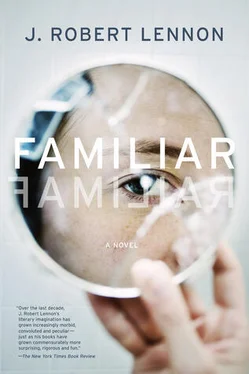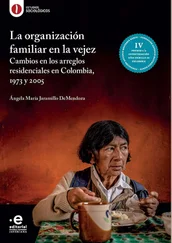When Elisa wakes it is not yet morning, or it is morning and the heavy curtains have been closed, and Patricia is sitting in the chair, which she has moved to the side of the bed and in which she seems to be praying silently. The only light comes from the night-light in the bathroom, and the glowing alarm clock, which is blinking 12:00, and the strip at the base of the door. Elisa feels hollowed out and queasy; her mouth is filled with paste. She sits up. A glass of water stands on the end table, so she picks it up and drinks from it. Patricia is staring at her.
“I’m here to help you,” Patricia says.
Her voice is unexpectedly rough and deep, like a heavy smoker’s. Perhaps, in a previous life, that’s what she was. She is holding something in her hands — a rosary? Elisa can’t quite make it out, only the pale thick fingers working at it.
She is so tired — more tired, if this is even possible, than she was when she collapsed into bed. She wants this strange woman to leave so that she can go back to sleep. It would be simple enough to tell her so. To ask her to leave. Elisa draws a deep breath. She says, “I don’t think you can.”
“Take my hands.”
“Patricia. You are Patricia, right? I’m sorry, I just need to sleep. I need to sleep.”
The desk chair is positioned two feet from the edge of the bed. Elisa yawns. It is possible that she falls asleep again, sitting up with her head against the bedboard, for a few minutes, or maybe an hour. When she opens her eyes, Patricia is still waiting. Her hands are empty now and lying, palms up, fingers spread, against the floral print of her dress. Her glasses are hanging around her neck on a chain. The gloom makes her seem both more and less real.
That’s it: Elisa must submit, or the woman will never leave. She drags herself to the edge of the bed, keeping the sheets twisted around her waist, covering her thighs. She drops her legs over the side, so that her knees are even with Patricia’s; just an inch separates their bodies. Elisa reaches out and places her two hands, faceup, onto the other woman’s palms.
“Okay,” she says, “help me.”
Patricia nods, once, and her heavy features rearrange themselves into a small, slow frown, a scowl of concentration. Her fingers close on Elisa’s hands.
Elisa is so disappointed now: both in the conference, and in herself, for the way she has behaved. Why did she kiss those people in the bar? Everyone saw her do it. Why did she ask Betsy that question? It seems to her that she has run out of chances, not just here, but in her life. That this is the way it will be now: things will keep being left behind and never returned to, and life will take on a depressing, inevitable forward momentum, like a glacier’s, slow and inexorable. And then it will end.
(She is wrong, of course. Things will change, they always do. There will be times when she looks back a few months, a week, even a day, and wonders at how innocent she was then, when the fabric of life felt so different. How could she be so oblivious to things that, in the here and now, are so obvious? Of course she will go back to Derek, eventually. He will, in fact, beg her to do so, going so far as to propose marriage to her a second time, though they won’t have divorced.
It is true that the boys will stay disappeared, that she won’t see them again for a long, long time. But they’ll be in touch, after a fashion. She and Silas will seek each other out online. He will use his sig lines as signals to her. He will go by various names, on various forums; he will track her interests, her obsessions, hovering at the boundaries of her attention, moving out of view when she gets too close. He won’t respond to messages. This will be their private game. They will follow one another’s iterations, they will die off and respawn in unexpected places, and she won’t tell Derek. And when at last he appears to her in the flesh, when he brings his brother to her as well, to forgive, it will be as sudden and inexplicable as everything else he’s done, yet it will feel perfectly natural to her, familiar and unfamiliar at the same time, like everything else in the strange, enormous, echo-filled room that is her life.
There was only ever one Lisa, she’ll tell herself then. There was only ever one life. It was just larger and more peculiar than she expected.)
But for now Patricia’s fingernails are digging themselves into her flesh, and Elisa feels herself tugged forward, her elbows popping and cracking with the sudden strain, and out of Patricia’s mouth comes a stream of loud, incomprehensible speech. Elisa cries out, tries to pull away from the other woman’s grip, but it’s too powerful, and Elisa is too tired and sick. “That hurts,” she says between clenched teeth, but Patricia isn’t listening, she’s talking, it’s all gibberish and Elisa can feel spittle landing on her bare arms.
And then Patricia’s voice rises; she’s shouting now. Surely this is waking up the other guests? Surely one of them is calling the front desk? The woman’s hands are crushing Elisa’s, she seems to be trembling; Elisa can feel it through the floor and can make out a glint of light from the dangling eyeglasses, shuddering in the air. Why doesn’t she pull away? Why did she let the woman into her room in the first place? It doesn’t seem like something I would do. That just doesn’t seem like me. Here she is, though: Elisa has given up on escaping her, this woman called DippedInSunshine.
And now she tries to concentrate, she tries to listen. Because that was her problem, wasn’t it — she didn’t listen. The roaring in her head was always louder. So she concentrates on her fear and on the pain in her hands and on the torrent of sounds spewing from Patricia’s mouth: these twisted vocalizations, the vowels elongated and shrill, the consonants clacking and popping in her face. It’s language. It’s saying something, something just for her, something that will help. She’s so tired, but she digs in: she grips back, hard, and the two women sit there, trying to break each other’s hands, one trying to understand, the other trying to make herself understood. Elisa wants to stop, but she can’t, she knows that the second it ends will be the second right before it would have started making sense. And so she bears down, telling herself it will work, that in the end it’s actually possible to believe in your dream so completely that you can drag the rest of the world into it with you.
For various kinds of assistance with this novel, the author would like to thank Tom Bissell, Jennifer Brice, Rhian Ellis, Brian Hall, Kristine Heiney, Fiona McCrae, Ethan Nosowsky, Jim Rutman, Ed Skoog, and Steve Strogatz.
J. ROBERT LENNONis the author of seven novels, including Castle and Mailman, and a story collection, Pieces for the Left Hand. His fiction has appeared in the Paris Review, Granta, Harper’s, Playboy, and the New Yorker. He lives in Ithaca, New York, where he teaches writing at Cornell University.












